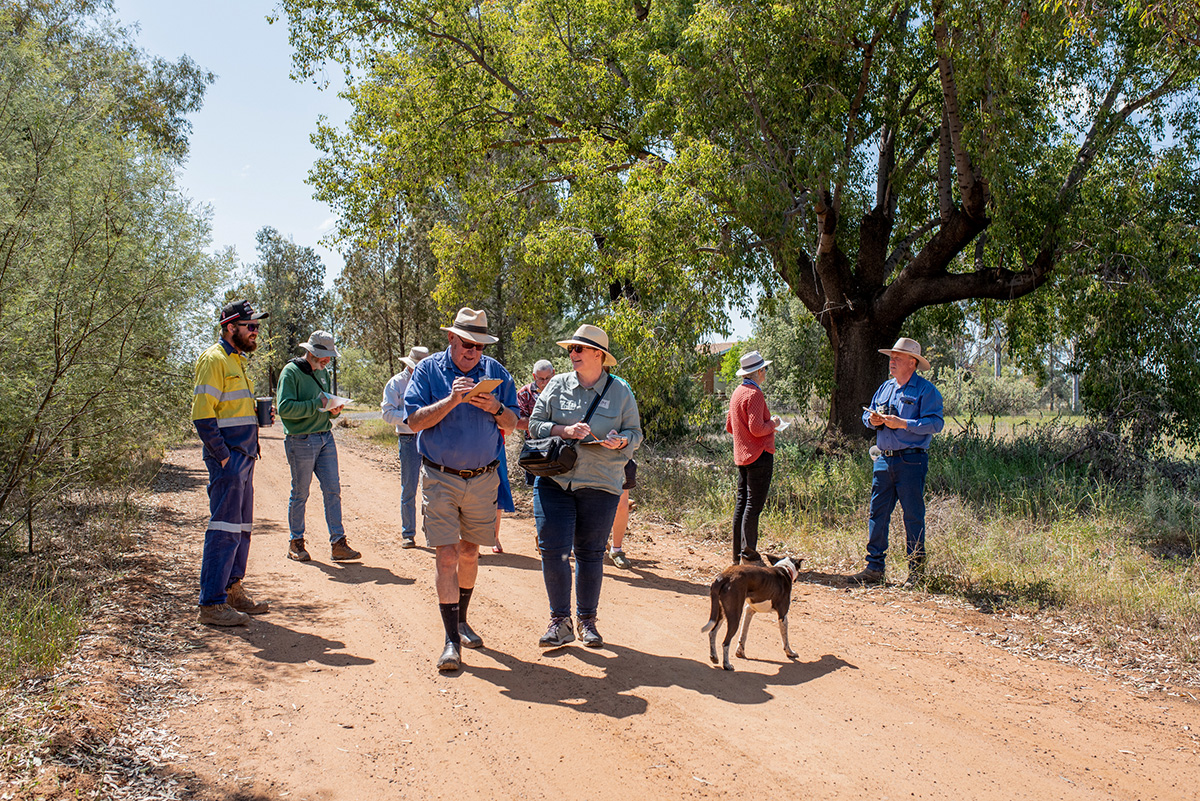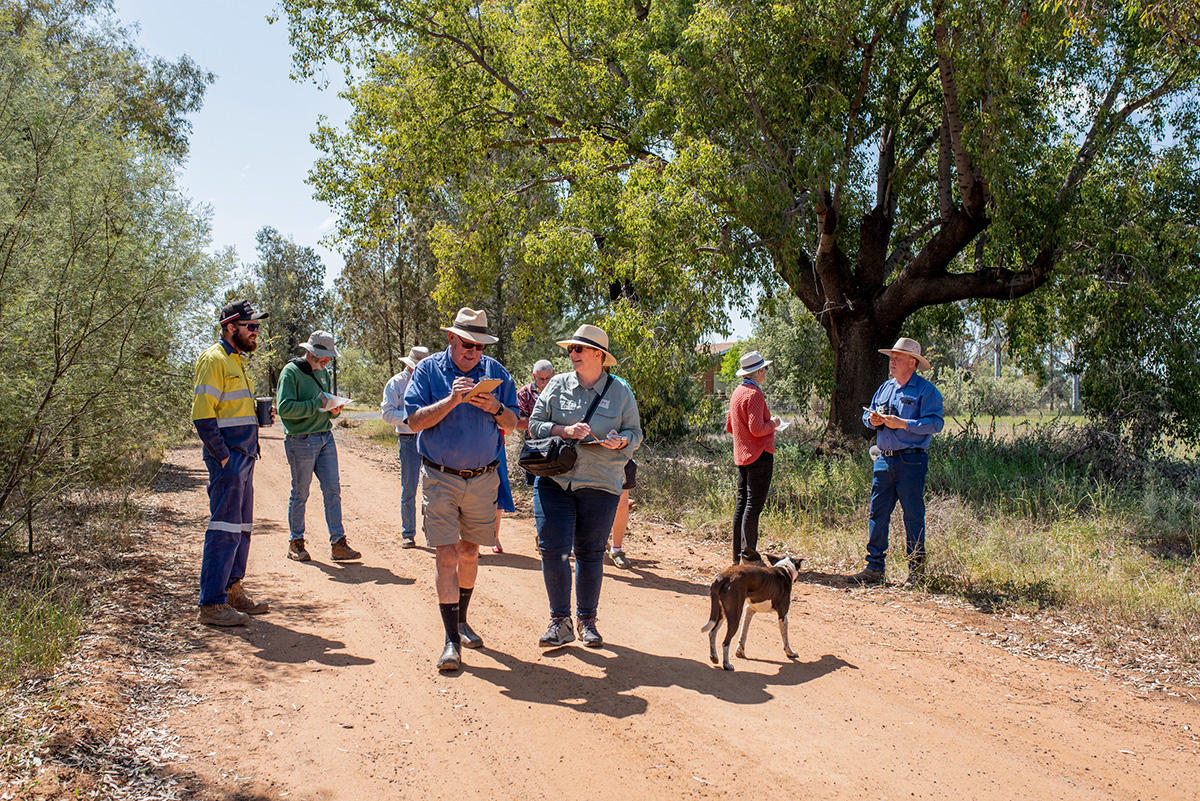Stories of Place, Community and Environment (SPACE) Walk, facilitated by Kim V. Goldsmith, is an act of walking together with different knowledge holders and community change-makers to creatively explore the local landscape and consider future possibilities for farming, the environment, the community, and the wider region.
This work is one of the shortlisted pieces for the 2024 Marŝarto Awards. Below, Kim discusses the work.
A SPACE Walk
People largely consider inland rural Australia a place of business; the business of primary production. Many often quickly pass through these territories on the way to somewhere else. If you live here, you just get on with things. Strolling down a rural road on a beautiful spring day, stopping in the shade of a tree to lean into someone’s story and to consider our legacy as inhabitants of this planet and place… that never happens.
Despite this, on a warm Saturday morning in spring, 11 people formally invited to walk together, gathered on a farm in the Narromine Shire of Central West New South Wales (Australia), on Wiradjuri/Wongaibon Country. With an age range of about 50 years, each person brought different experiences, knowledge and understanding of time and place. Some knew each other, some didn’t. Everyone who turned up was generous, trusting in the invitation to share their stories and the need to gently hold other’s feelings and thoughts about the future.

I’m a multi-media artist and writer who loves field recorded sound, storytelling, history, ecology, walking as process, and the flat horizons and big skies of my rural home region about five hours west of Sydney. The Stories of Place, Community and Environment (SPACE) Walk has been part of a year-long creative rural research residency, SOIL+AiR: creative future landscapes, started in July 2024. While I try not to, I fear for the future of this part of the world and places like it. Far from urban and political centres, I worry that as our inland climate becomes increasingly volatile and our populations age and dwindle, we will be forgotten.
How do we even begin to imagine?
It’s been almost 200 years since this area was settled by those looking for something more than what they left behind. My farming ancestors from Ireland, England and Germany took up land here in the 19th century, even though it wasn’t their land to take. Over successive generations this ancient landscape has been transformed, damaged in the belief there was a certain way to do things.
Today, rural and regional Australia is on the coalface of rapid ecological, socio-economic, and cultural change. However, in the 1990s the Maynard family, hosts of my residency project and the SPACE Walk, saw the need to change how they farm. Their farm now sounds, feels and looks very different to others in the area. The SPACE Walk taps into many of the ideas behind this regenerative or agro-ecological way of farming.
Despite the issues, this is still a place where communities come together to make things happen, driven by the volunteers who help at the community health clinics, coach local sporting teams, who raise money for good causes, deliver food to the elderly, help neighbours fix a fence, or simply sit and listen over a cuppa. I grew up on a large family farm somewhere very similar to this about two hours north. I’ve lived and worked in this part of the wider region since the early 1990s, listening to and sharing many stories over tea and biscuits in farmhouse kitchens, leaning over fences in the dust at sheep sales, in the middle of paddocks during planting and harvest, during breaks at farming conferences, on the rowdy sidelines of local rugby games, and in hushed tones over drinks at the local pub after a funeral.
Until the SPACE Walk, I’d never had a robust, heartfelt conversation with anyone, anywhere, about the future; what our legacy might be, what actions we each need to take responsibility for to be good ancestors, and why and how we include more voices in the conversations we must keep having. I wasn’t even sure people would want to talk about these things. In my experience, it’s often easier to stick to local gossip, sporting results, politics, interest rates and the economy, market prices, the value of the Aussie dollar, and the weather. We also tend to think in days, weeks, seasons, and election cycles, not decades or centuries. How do we even begin to imagine what our communities, ecosystems, and economies might be like in 50, 70, 100 years or more?
Starting this conversation was a big ask.
Start conversations you can’t finish
I had a few basic guidelines for the walk participants. Listen with respect, with intent, and to understand; be generous with each other and what you share; ask why; and walk beside a stranger. I also encouraged everyone to actively map their walk around the farm with walking drawings on blank postcards, and each person was given a cue card with questions about connections, diversity, ways of knowing, purpose, and imagination. Each card had the same question on the back: What does being a Good Ancestor mean to you?

At a listening lab of microphones buried in the soil around a majestic Kurrajong (an Australian native tree), the end of the walk allowed us to listen attentively to the sounds of more-than-human species below ground who share this world with us, subtly drawing new voices into the conversation.
Over two hours of walking through what was a familiar landscape to many, it revealed itself in new ways, coloured by our imaginations, shaped by our senses, and valued for the connections made by listening attentively while undertaking this common action together. Sharing the experience and food we’d each brought for lunch, messages to future kin were written on the back of our walking drawings as a pledge to act on those things that we can be responsible for, and to keep the conversation alive.
Dear future kin, start conversations you can’t finish. A thousand generations have led you to this point…

The winner and honourable mention of the Marŝarto Awards 2024 will be announced in early 2025.
APA style reference
| featured |
| New South Wales |
| Australia |



